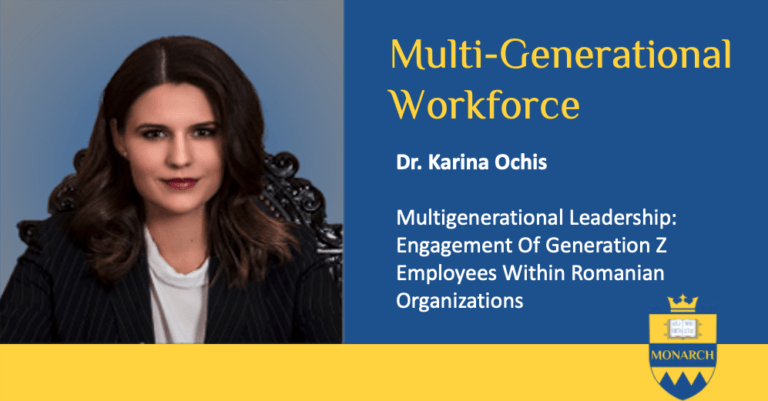Dr. Karina Ochis Graduates The Dual PhD / DOAL Combined Program

Congratulations To Dr. Ochis
It is with great pleasure that, as the Dean of the School, I announce that Doctoral Candidate Karina Ochis has successfully met the requirements under the Dual PhD in Business Research / Doctor of Applied Leadership Combined program and is now welcomed as an Alumni of the School.
Dr. Ochis started with Monarch in August 2018 and completed the defense procedure in the fall session of October 2021. Dr. Ochis satisfied all requirements of the program and has been welcomed as a Doctoral graduate of the School with the honor of “Summa Cum Laude”.
Dr. Ochis has been a strong supporter of Monarch since beginning with the school. She has attended several Doctoral workshops in Switzerland and has assisted in the development of courses at all levels. Dr. Ochis is also received the 2021 ACBSP Student Leadership Award for her outstanding support of the school and continuous Doctoral Candidate example.
Dr. Ochis continues with Monarch as a faculty member under Dr. York and holds the title of Assistant Dean of Student Development. Please join us in congratulating Dr. Ochis on her exemplary accomplishment and we wish her continued academic, professional and personal success as she moves forward.
The Research
Employee disengagement is a source of trouble for world-wide businesses with 85% of global employees being actively disengaged at work equating to financial consequences of approximately $7 trillion in lost productivity (Sheep, 2006; Harter, 2017). Young employee stigmatization correlated with the lack of research on Generation Z, the youngest generational group of employees penetrating the workforce, results in high organizational turnover, younger employees lacking mentorship and further disengagement (Myers & Sadaghiani, 2010; Marston, 2007; DeLong, 2004).
The research is believed to be the first to extract data from the four generational groups constituting the workforce namely Generations X, Y, Z and Boomer and to compare perceptions from Generation Z employees and managers belonging to the older generational groups, uniquely incorporating the personal, institutional and societal levels of analysis in the engagement discourse. The research disputes existing literature that indicates intergenerational conflict is the result of differences between generational groups and described the power generated conflict between the multigenerational workforces.
The Researcher
 As a next generation leader, Dr. Karina Ochis holds the position of CEO at KO Sci-Fi Branding, President of The Elite Group, Executive Consultant, Author and Speaker. She is dedicated to the pursuit of life mastery while running innovative businesses and aims to be a transformative scholar across multiple fields and disciplines. She is a devoted professor, an impactful consultant, and a tireless advocate for the future generations through her speeches, publications, interviews and work.
She holds a Ph.D. In Business Research and Doctorate of Leadership Summa Cum Laude as well as an M.Phil. in Business Research Cum Laude from Monarch, an MA in Political Marketing from Rome Business School High Honours along with a BA degree in Politics from the University of London. She holds further specialization certificates in Digital Strategy from the Online Marketing Institute in San Francisco, in Marketing and E-commerce from the London School of Economics and Political Science and in Macroeconomics from the University of California. Dr. Ochis is a beneficiary of various awards in several disciplines including the ACBSP Student Leadership Award, the Quilly Award in Hollywood California, Honorary Contribution Award from the Arab Trainers Union.
Dr. Ochis’ academic interests center around Multigenerational Management, Leadership, Personal Branding, Political Marketing, Virtual Reality and Succession Management. She is uniquely interested in managing inter-generational conflict for a better integration of the younger generational groups into the workforce.
Dr. Ochis is an accomplished public speaker having participated in many conferences and summits, including TEDx, Million Marketing Tour, The Romanian Academy of Economic Studies, 16th Fingerprint of Change Conference Istanbul, and The 5th Forum of Arab Trainers Union Cairo. Professor Ochis is a member of The US National Association of Experts, Writers and Speakers and the Arab Trainers Union. She is often interviewed in the popular and business press and has been featured in Entrepreneur and The Huffington Post.
As a next generation leader, Dr. Karina Ochis holds the position of CEO at KO Sci-Fi Branding, President of The Elite Group, Executive Consultant, Author and Speaker. She is dedicated to the pursuit of life mastery while running innovative businesses and aims to be a transformative scholar across multiple fields and disciplines. She is a devoted professor, an impactful consultant, and a tireless advocate for the future generations through her speeches, publications, interviews and work.
She holds a Ph.D. In Business Research and Doctorate of Leadership Summa Cum Laude as well as an M.Phil. in Business Research Cum Laude from Monarch, an MA in Political Marketing from Rome Business School High Honours along with a BA degree in Politics from the University of London. She holds further specialization certificates in Digital Strategy from the Online Marketing Institute in San Francisco, in Marketing and E-commerce from the London School of Economics and Political Science and in Macroeconomics from the University of California. Dr. Ochis is a beneficiary of various awards in several disciplines including the ACBSP Student Leadership Award, the Quilly Award in Hollywood California, Honorary Contribution Award from the Arab Trainers Union.
Dr. Ochis’ academic interests center around Multigenerational Management, Leadership, Personal Branding, Political Marketing, Virtual Reality and Succession Management. She is uniquely interested in managing inter-generational conflict for a better integration of the younger generational groups into the workforce.
Dr. Ochis is an accomplished public speaker having participated in many conferences and summits, including TEDx, Million Marketing Tour, The Romanian Academy of Economic Studies, 16th Fingerprint of Change Conference Istanbul, and The 5th Forum of Arab Trainers Union Cairo. Professor Ochis is a member of The US National Association of Experts, Writers and Speakers and the Arab Trainers Union. She is often interviewed in the popular and business press and has been featured in Entrepreneur and The Huffington Post.
